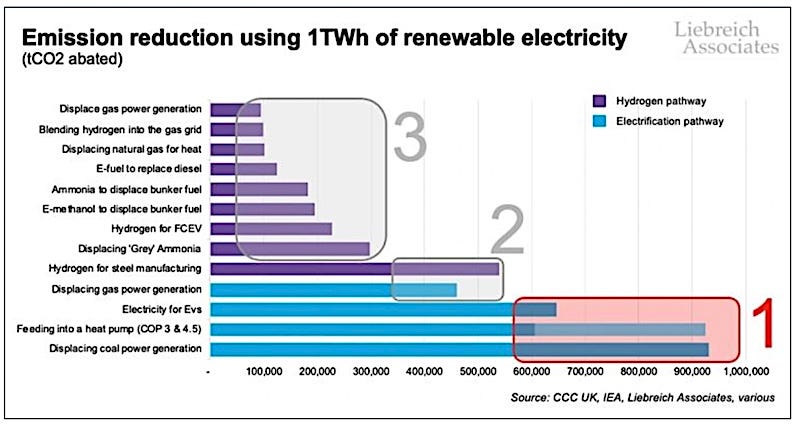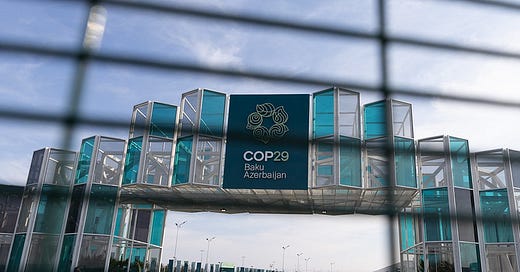‘Oil and Gas is a Gift from God’: How Does COP29 Come Back from That?
Even with a lukewarm result, the 2015 Paris climate conference inspired such hope and momentum. Now the COP has been taken over by petrostates. How did we get here, and what do we do now?
What a difference a decade makes.
After a week of mostly horrific news from COP29 in Baku, Azerbaijan, where yet another petrostate is hosting yet another climate summit, it looked like the United Nations process for getting climate change under control was at risk of imploding. Much of the high-level rhetoric seemed to be careening toward irrelevance at just the moment when we most need delegates to step up and get serious.
It was such a different scene in 2015, when the world gathered for the Paris climate conference. Countries had spent many months preparing for the two weeks onsite, building momentum and consensus for a global deal to get the climate emergency under control.
The end result in Paris dodged many of the key decisions that would have delivered the deep emission reductions we so desperately needed, then and now. Crucially, it postponed the financing that will enable the world’s most vulnerable countries and regions to decarbonize their economies and deal with the devastating climate impacts they’re already living through.
A decade later, for the most part, they’re still waiting.
But COP21 still delivered enough progress to keep up the momentum, conveying a new level of seriousness and the hope of further gains in the years that followed.
I remember the mix of nerves and excitement as I arrived at the conference site in Paris to pick up my credentials for COP21. Finally, I thought, with the blind hope of a first-time participant, we’re going to do something big to reverse climate change.
Here’s Where Things Stand
Nine years on, here’s where things stand.
• Global temperatures almost routinely smash previous records month after month, with 2024 virtually certain to tip over the Paris Agreement’s 1.5°C threshold for the first time.
• Carbon dioxide emissions will hit yet another all-time high this year, the Global Carbon Project predicts, after record emissions last year put global warming on track for a “catastrophic” 2.6° to 3.1°C, the UN Environment Programme states.
• Those warming projections are “flatlining”, Carbon Action Tracker reported Thursday, with no improvement in three years—all years, let’s add, when the COP has been hosted by petrostates.
• Atmospheric CO2 now stands at 420 parts per million, an 11% increase in a scant two decades. Methane measurements have been surging.
• Oil and gas extraction hit a record 55.5 billion barrels of oil equivalent last year, according to Urgewald and the 34 other NGOs that produce the annual Global Oil & Gas Exit List, which covers 1,769 companies responsible for 95% of global production.
And the costs—for people, ecosystems, and economies—are piling up. Last week, the International Chamber of Commerce reported that extreme weather cost US$2 trillion globally over the past decade, with the United States, China, and India taking the heaviest hits. Those impacts have already cost vulnerable island nations US$141 billion, all leading up to a year that UN Secretary-General António Guterres described last week as a “masterclass in human destruction”.
Sure, the International Energy Agency now routinely projects that demand for all three fossil fuels will peak this decade, then begin to decline. But in recent years, that’s mostly been in spite of COP delegates’ best efforts, not because of them.
So we needed this year’s negotiations to deliver. That would mean deviating from the same old cycle of promises from the COP hosts, followed by self-congratulatory declarations at the end of the conference, which last two or three months before countries start to walk back their commitments.
But so far, the only difference is that the sabotage started a lot sooner, with the conference hosts wielding the knife.
A Love Song to Fossil Fuels
One of the bedrock responsibilities of the country that takes on each year’s COP presidency is to set aside its own national agenda, look out for the interests of the Paris climate agreement itself, listen for possible areas of consensus, and skillfully guide the negotiations to the best possible conclusion.
“A COP host’s main job is to smooth things over,” Politico writes. Instead, Azerbaijan seems to be making best efforts to “crater” its own climate conference.
On Monday, President Ilham Aliyev opened the two weeks of talks by declaring oil and gas a “gift from God”, asserting that “countries should not be blamed for having them and should not be blamed for bringing these resources to the market because the market needs them. The people need them.”
Then two days later, during a meeting of small island developing states, Aliyev “tore into France and the Netherlands for what he described as ‘repression’ and ongoing colonial rule,” Politico says. The comments earned “significant applause” from the islanders, but predictably “furious rebuttals” from the two former colonial states, with French Ecological Transition Minister Agnès Pannier-Runacher cancelling plans to attend the COP.
All of this distraction brought to you by the country with a “critically insufficient” commitment to emission reductions, according to Climate Action Tracker, where an already deeply repressive government amped things up in preparation for the COP while using its role in the conference to line up future gas export deals.
Oil and gas represents about half of Azerbaijan's total economy and more than 90% of its exports, BBC writes, citing data from the United States.
At times, it must have seemed as though the most coherent defence of the COP process was coming from ExxonMobil CEO Darren Woods, who on Tuesday urged Donald Trump not to repeat history by pulling the United States out of the Paris accord when he bumbles back into the White House in January. “We need a global system for managing global emissions,” Woods told the New York Times in an interview in Baku.
It’s hard to imagine better proof that UN climate negotiations are no threat to the industry most responsible for the emissions that are super-heating the atmosphere and driving the Earth into chaos. But Global Witness sealed the deal last week with its report that 1,773 fossil industry lobbyists were flooding the negotiating rooms in Baku, receiving far more delegate passes than the 10 most climate-vulnerable nations combined. Some 480 were onsite touting carbon capture and storage, “a misguided technology that prolongs fossil fuel use,” the Center for International Environmental Law wrote in a release.
More than two dozen fossil lobbyists tagged along as members of Canada’s official delegation, Environmental Defence Canada reports.
Making the COP Fit for Purpose
The continuing shenanigans had a list of nearly two dozen COP dignitaries—including former UN climate secretary Christiana Figueres, former UN secretary-general Ban Ki-moon, former president of Ireland Mary Robinson, and climate science superstar Johann Rockström—declaring the COP process as it now stands no longer fit for purpose.
“We recognize the important diplomatic milestones of the past 28 years of climate negotiations,” they wrote, in an open letter published Friday by the Club of Rome. “A remarkable consensus has been achieved with over 195 countries having agreed to strive to hold global warming to 1.5°C.”
However, the annual summit’s
current structure simply cannot deliver the change at exponential speed and scale, which is essential to ensure a safe climate landing for humanity. This is what compels our call for a fundamental overhaul of the COP. We need a shift from negotiation to implementation, enabling the COP to deliver on agreed commitments and ensure the urgent energy transition and phaseout of fossil energy.
The leaders’ seven-point prescription begins with a call for stricter eligibility criteria “to exclude countries who do not support the phaseout/transition away from fossil energy.” The signatories say the UN process must also:
• Transform into “smaller, more frequent, solution-driven meetings” that shift the COP’s focus “from negotiations to the delivery of concrete action”;
• Hold countries accountable for their climate targets;
• Ensure robust tracking of climate finance;
• Bring “authoritative science” to the centre of the process;
• Recognize “the interdependencies between poverty, inequality, and planetary instability”; and
• Correct the “systemic imbalance” of a negotiating process involving “far more fossil fuel lobbyists than official representatives from scientific institutions, Indigenous communities, and vulnerable nations.”
After the “not fit for purpose” line was interpreted as trashing the UN process, rather than expecting better of it, Figueres was moved to post a clarification on social media, the UK’s Energy & Climate Intelligence Unit reported Saturday morning. She wrote:
The COP process is an essential and irreplaceable vehicle for supporting the multilateral, multisectoral, systemic change we urgently need. Now more than ever. We are committed allies to and advocates for this process—and lend our total support to positive efforts under way to further strengthen it for the new era of implementation we are entering into. As the UN, countries, and the groundswell of non-state actors have demonstrated—we all need COP29 to deliver the leadership that people, communities, businesses urgently want and need.
Focusing Where Change Can Happen
If the UN had bought in to the climate leaders’ vision when a longer list of signatories and supporters first asked them to nearly two years ago, you would have seen a lot more COP news on The Energy Mix over the last week.
In the past, we’ve covered the annual conference extensively, sometimes pushing our small but mighty reporting team to produce daily or near-daily updates on the negotiations. That’s because the deeply-ingrained habit in any self-respecting news organization is to leap at every breaking headline. Especially when it matters so much.
But this year, as each day’s COP news rolled, we kept asking ourselves: How often can we tell the same detailed, granular, insider story about urgent calls to action from UN leaders, glacially slow negotiations, an ascendant fossil fuel lobby, and an actively hostile, repressive conference host?
What value do we deliver by bringing that same old narrative to our readers, again and again, when they’ve heard it all so many times before?
Why could they possibly want us to?
How can we not?
In the end, we’re taking this year’s COP pretty much as seriously as Azerbaijan seems to take the climate crisis.
We covered the opening and looked at the shifting geopolitics that could result from Trump’s return in the U.S.
We’re keeping an eye on urgent negotiations on international climate finance, and the slow progress on COP28 commitments to triple renewable energy capacity and double the pace of energy efficiency by 2030, and to “transition away” from fossil fuels. At last report—shocker!—Saudi Arabia was putting up a fight against restating the fossil fuel phaseout commitment in this year’s COP decision, despite best efforts by the European Union and this year’s U.S. delegation to keep it alive.
We’ll report the results as they happen. But for this year’s COP, we’re not holding our breath. In the meantime, we’re paying attention to front-line efforts to deliver on local climate and energy solutions, build public demand to scale those solutions up, and focus on efforts by cities, provinces and states, businesses, and regular citizens that will be even more important when Donald Trump re-enters the Oval Office in just over two months.
None of us should be pleased that those routine, incremental, local stories have taken on more significance than the COP—the annual event that is supposed to be our best shot at global cooperation on the most urgent crisis of our lifetimes. If Figueres, Ki-moon, and the rest of the Club of Rome authors have their way, things will change, and we’ll all be better for it.
But at least until then, we should all be ready to double down on anything we’re already doing to rapidly reduce emissions, increase climate resilience, deploy renewable energy and energy efficiency, and phase out fossil fuels—in the communities where we live, in the sectors where we work, and anywhere else we can lead or influence those changes.
Because it’s crystal clear that Azerbaijan isn’t going to do it for us.
Mitchell Beer traces his background in renewable energy and energy efficiency back to 1977, in climate change to 1997. Now he and the rest of the Energy Mix team scan 1,200 news headlines a week to pull together The Energy Mix, The Energy Mix Weekender, and our weekly feature digests, Cities & Communities and Heat & Power.
Chart of the Week

$80B Windfall for U.S. Trade Partners, Competitors if Trump Cuts Clean Energy Funds
China Could Fill the Void as Trump Casts Shadow Over COP29
Trump Presidency Threatens, Doesn’t Doom Biden’s Climate Plan, Experts Say
Vancouver at a Crossroads as Cities Tackle Climate, Health, and Cost Impacts of Gas
Ottawa to Unveil High-Speed Rail Bid For Toronto–Quebec City Corridor
Hydrogen Projects Delayed, Cancelled as ‘Hype’ Meets Reality
COP29 Opens in Azerbaijan Amid Controversy Over Fossil Fuel Ties
U.S. Election Sees Significant Down-Ballot Wins for Climate, Environment
Stellantis to Road Test Solid State Batteries
Donald Trump’s election ‘will have minor impact on global warming’ (The Times of London)
Canada's oil & gas industry likely to cut production under new rules: Morningstar DBRS (Yahoo! Finance)
Nuclear plant operator rejects ideas to restart Germany’s reactors on economical grounds (Clean Energy Wire)
Taiwan eyes Canadian natural gas to supply its growing energy needs (Globe and Mail)
Quebec First Nation says provincial government, Hydro-Quebec left it out of wind projects (Globe and Mail)
‘Total Nightmare’ as Wildfire Burns Through Southern California Homes (New York Times)
New York to Revive Congestion Pricing With $9 Toll (New York Times)
Edmonton fails to meet climate targets 2 years after launching carbon budget (Canadian Broadcasting Corporation)
Solar modules now selling for less than €0.06/W in Europe (PV Magazine)
Volkswagen and Rivian Form EV Joint Venture, Deepening Alliance (New York Times)
Over-reliance on land for carbon dioxide removal in net-zero climate pledges (Nature Communications)
Climate crisis leaves European farmers vulnerable to far right, say campaigners (The Guardian)







